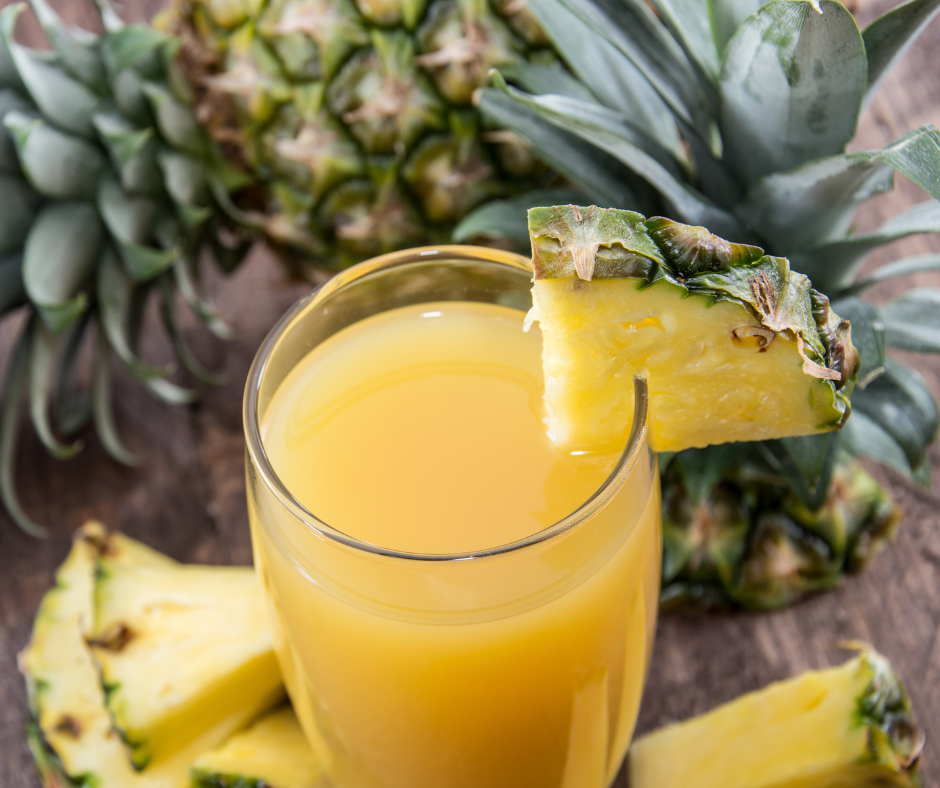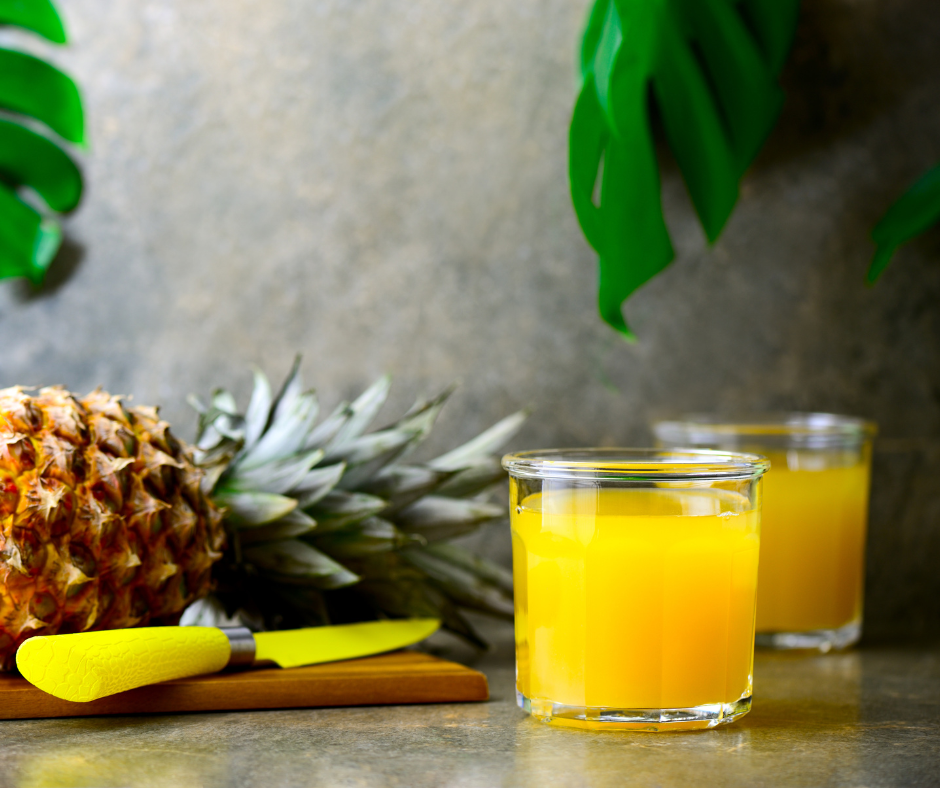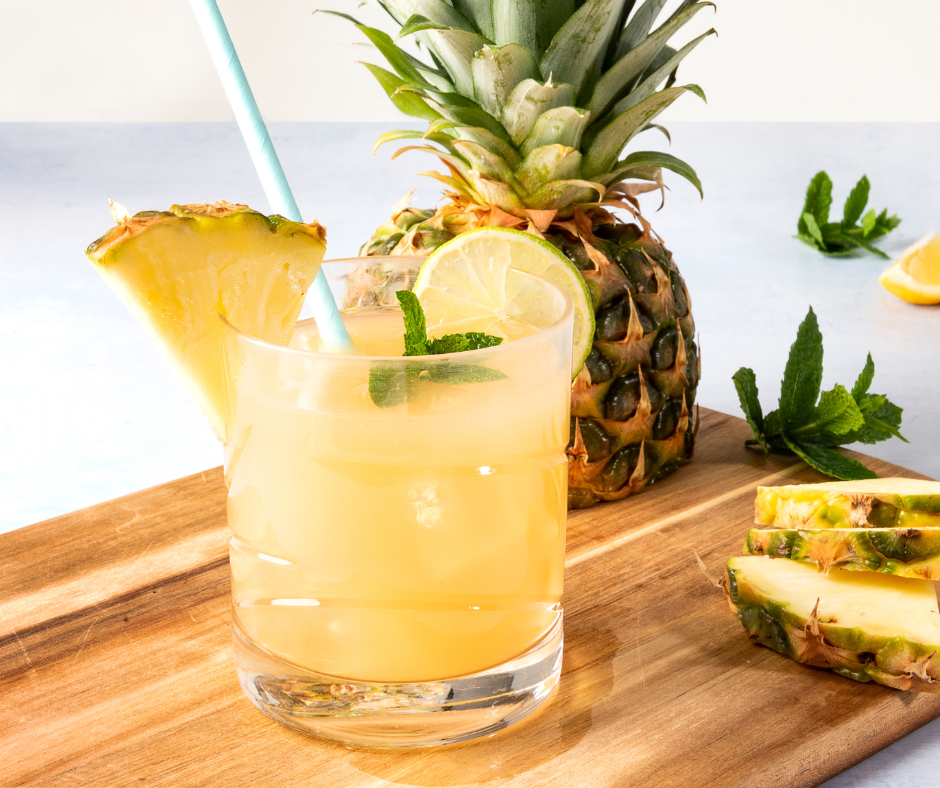Introduction
For centuries, pineapple has been revered not only for its sweet and tangy taste but also for its potential health benefits. One such benefit that has gained attention is its alleged ability to help with swelling. This article will explore the connection between pineapple juice and inflammation to determine ‘Does Pineapple Juice Help With Swelling?‘.
Overview Of Pineapple And Its Potential Health Benefits
Pineapple, known scientifically as Ananas comosus, is a tropical fruit that is a rich source of vitamins, minerals, and enzymes. It contains bromelain, a group of enzymes that have been studied for their potential health benefits. Bromelain is believed to have anti-inflammatory properties, which could make pineapple juice a potential remedy for swelling.
Aside from its potential anti-inflammatory effects, pineapple also provides other health benefits. It is packed with vitamin C and manganese, which are vital in supporting a healthy immune system. Pineapple is also rich in fiber, which aids in digestion and helps maintain a healthy gut.
Brief Explanation Of The Focus On Pineapple Juice And Swelling
When it comes to swelling, pineapple juice has gained attention due to its bromelain content. Bromelain has been studied for its potential to reduce inflammation and swelling in various conditions, such as arthritis and sports injuries. It is believed to work by breaking down proteins contributing to inflammation, thus reducing swelling and pain.
While some studies have shown promising results regarding the anti-inflammatory properties of bromelain, more research is needed to determine its efficacy, specifically in reducing swelling. It is important to note that the amount of bromelain present in pineapple juice can vary depending on the ripeness of the fruit and the extraction method used.
It is also worth mentioning that pineapple juice alone may not be a miracle cure for swelling. Combining it with other therapies such as rest, ice, compression, and elevation (RICE) for acute injuries or following medical advice for chronic conditions is recommended.
In conclusion, pineapple juice contains bromelain, which has potential anti-inflammatory properties. While some evidence supports its efficacy in reducing swelling, more research is needed to determine the optimal dosage and effectiveness. Pineapple juice can be a part of a healthy diet and may provide other benefits, but it should not replace medical advice or treatment for any underlying conditions causing swelling. As always, it is best to consult with a healthcare professional before significantly changing your diet or treatment plan.
Does Pineapple Juice Help With Swelling?
Many people know pineapple for its juicy, tropical flavor, but did you know that it also contains a powerful compound that may help with swelling and inflammation?
Bromelain: The Key Compound In Pineapple Juice
Pineapple juice contains a natural enzyme called bromelain in the fruit’s core and stem. Bromelain has been shown to have anti-inflammatory and analgesic properties, making it a popular natural remedy for various health conditions. It is also commonly used as a meat tenderizer and digestive aid.
Bromelain is a mixture of enzymes, including proteases, responsible for breaking down proteins. However, it is important to note that bromelain is not exclusive to pineapple juice but can also be found in the fruit.
Effects Of Bromelain On Swelling And Inflammation
Research suggests that bromelain may help with swelling and inflammation. In a study published in the Journal of Medicinal Food, researchers found that bromelain exhibited anti-inflammatory effects by reducing the production of pro-inflammatory cytokines. Another study published in the Journal of Ethnopharmacology showed that bromelain inhibited the release of inflammatory mediators and enzymes associated with inflammation.
Furthermore, bromelain has been studied for its potential to alleviate symptoms of several inflammatory conditions. A study published in Phytomedicine found that bromelain reduced pain and swelling in patients with osteoarthritis. Another study published in Surgical Endoscopy investigated the effects of bromelain in patients undergoing surgery and concluded that it significantly reduced postoperative swelling.
It is important to note that while bromelain shows promise in reducing swelling and inflammation, more research is needed to fully understand its mechanisms of action and effectiveness in treating specific conditions.
In addition to its potential anti-inflammatory effects, pineapple juice contains other beneficial nutrients, including vitamins C and B6, manganese, and antioxidants. These nutrients contribute to overall health and may further support the body’s inflammatory response.
While pineapple juice alone may not cure swelling and inflammation, incorporating it into a balanced diet rich in fruits and vegetables can provide numerous health benefits. It is always recommended to consult with a healthcare professional before using natural remedies or supplements for managing specific health conditions.
So, Does Pineapple Juice Help With Swelling? Pineapple juice contains bromelain, a compound with anti-inflammatory properties that may help with swelling and inflammation. However, more research is needed to establish its effectiveness for specific conditions. Incorporating pineapple juice into a well-rounded diet can provide additional health benefits. If you are considering using pineapple juice or bromelain as a natural remedy, it is best to consult with a healthcare professional for guidance.
Pineapple Juice And Swelling
Research Studies Investigating The Effects Of Pineapple Juice On Swelling
Pineapple is a tropical fruit known for its sweet and tangy taste, but it may also have potential health benefits. One area of interest is its effect on swelling. Several research studies have explored the potential anti-inflammatory properties of pineapple juice.
A study published in “Food & Function” found that pineapple extract exhibited anti-inflammatory effects in animal models. It was shown to reduce swelling and decrease inflammatory markers in the body. Another study published in the “Journal of Clinical Biochemistry and Nutrition” found that bromelain, an enzyme in pineapple juice, had anti-inflammatory properties and could promote tissue healing.
Findings On The Reduction Of Swelling And Healing Time
Bromelain is the active ingredient in pineapple juice that is believed to have anti-inflammatory effects. Bromelain has been studied for its potential benefits in reducing swelling and promoting healing. It is thought to work by breaking down proteins that contribute to inflammation.
While the research is limited, and more studies are needed to understand the effects of pineapple juice on swelling fully, some anecdotal evidence suggests that it may help reduce swelling associated with minor injuries, such as sprains or strains. It is believed that consuming pineapple juice or fresh pineapple may have a similar effect due to the presence of bromelain.
It’s important to note that pineapple juice alone may not provide significant relief for severe swelling or chronic inflammatory conditions. If you are experiencing persistent or severe swelling, it is recommended to consult with a healthcare professional for proper diagnosis and treatment options.
Precautions And Considerations When Using Pineapple Juice For Swelling
While pineapple juice may reduce swelling, there are a few precautions and considerations to remember.
Firstly, some individuals may be allergic to pineapple or bromelain. If you have a known pineapple allergy or experience allergic reactions such as itching, swelling, or difficulty breathing, avoiding consuming pineapple or pineapple juice is important.
Secondly, pineapple juice contains natural sugars and calories. If you are watching your calorie intake or have diabetes, it is advisable to consume pineapple juice in moderation or consult a healthcare professional for personalized dietary guidance.
Lastly, pineapple juice may interact with certain medications, including blood thinners and antibiotics. It is important to speak with your healthcare provider if you are taking any medications to ensure no potential interactions.
In conclusion, while pineapple juice may potentially reduce swelling and promote healing, more research is needed to understand its effects fully. It is important to use pineapple juice as a complementary approach and consult a healthcare professional to properly diagnose and treat any swelling or inflammatory conditions.
Incorporating Pineapple Juice Into Your Diet
Whether seeking natural remedies for inflammation or simply looking to add tropical flavor to your diet, pineapple juice can be a delicious and healthful addition to your daily routine. Packed with vitamins, minerals, and enzymes, pineapple juice offers a range of potential benefits. Let’s explore how you can incorporate pineapple juice into your diet, its potential health benefits, and the recommended dosage for consumption.
Tips And Suggestions For Adding Pineapple Juice To Your Daily Routine
- Enjoy it as a refreshing beverage: Start your day by sipping chilled pineapple juice. Mix it with other juices or sparkling water for a fruity twist.
- Incorporate pineapple juice into smoothies: Blend pineapple juice with your favorite fruits, yogurt, and a handful of greens for a nutritious tropical smoothie.
- Use it as a marinade: Pineapple juice contains bromelain, an enzyme that can tenderize meat. Marinating your meats in pineapple juice can add flavor and help break down proteins, making them more tender.
- Add it to sauces and dressings: Pineapple juice can be a delicious addition to homemade sauces and dressings, giving them a sweet and tangy twist.
Other Potential Health Benefits Of Pineapple Juice
Aside from its possible anti-inflammatory properties, pineapple juice offers a range of other potential health benefits. It is rich in vitamin C, which helps support the immune system and promotes collagen formation. Pineapple juice also contains manganese, an essential mineral for bone health and energy production. Additionally, the bromelain in pineapple juice has been associated with aiding digestion and reducing bloating.
Recommendations For Consumption And Dosage
While pineapple juice has numerous health benefits, consuming it in moderation is important. The American Heart Association recommends limiting added sugars to 6 teaspoons (25 grams) daily for women and nine teaspoons (38 grams) for men. It’s also worth noting that pineapple juice is relatively high in natural sugars, so it’s advisable to enjoy it as part of a well-balanced diet.
For those with specific health conditions or concerns, it’s always best to consult a healthcare professional before making significant changes to your diet.
In conclusion, incorporating pineapple juice into your diet can be a simple and enjoyable way to add a tropical twist to your routine while potentially reaping its health benefits. Whether you sip on a refreshing glass, blend it into a smoothie, or use it as a marinade, pineapple juice can bring a vibrant and delicious touch to your meals. Just remember to consume it in moderation and as part of a healthy and balanced diet.
FAQ: Does Pineapple Juice Help With Swelling? – Tropical Remedy? Exploring Pineapple Juice and Inflammation
Q: Has pineapple juice been used historically to help with swelling and inflammation?
A: Pineapple has been used for centuries in Central and South America to treat indigestion and reduce inflammation.
Q: What component in pineapple juice contributes to its potential immune benefits and healing properties?
A: Bromelain, derived from the pineapple’s stem and juice, is believed to be responsible for the potential immune benefits and healing properties of pineapple juice.
Q: Has pineapple juice been studied for its effects on inflammation?
A: There have been studies examining the effects of pineapple juice on inflammation. Researchers have found that pineapple juice may help reduce healing time and has potential anti-inflammatory properties.
Q: Are there any precautions to consider when consuming pineapple juice?
A: While pineapple juice can have various health benefits, it’s important to note that excessive consumption may cause digestive issues or irritate the mouth due to its enzyme content. It’s best to consume pineapple juice in moderation.
Q: Can pineapple juice help with swelling?
A: Pineapple juice contains bromelain, and research suggests that bromelain may help reduce swelling, particularly after sinus surgery. However, further studies are needed to confirm its effectiveness in treating swelling.
Q: Can pineapple juice be used as a tropical remedy for inflammation?
A: Pineapple juice is believed to have anti-inflammatory properties due to its bromelain content. While it may provide some relief, it should not be considered a sole treatment for inflammation. Consulting with a healthcare professional is recommended for a comprehensive treatment plan.
Q: Can pineapple juice prevent or treat cancer?
A: Some studies have shown that pineapple juice, particularly the core stem and flesh, contains compounds that suppress the growth of ovarian and colon cancer cells in in vitro studies. However, more research is needed to determine the connection between pineapple juice and cancer prevention or treatment in humans.
Q: Can pineapple juice aid in digestion?
A: Pineapple juice may promote improved digestion when consumed as part of a high-fiber diet rich in fruits and vegetables. However, individual results may vary, and it is always important to maintain a balanced diet; consulting with a healthcare professional for specific digestive concerns is always important.
Q: Is pineapple juice a good source of essential nutrients?
A: Pineapple juice contains various essential nutrients, including vitamins, minerals, and antioxidants. However, it is important to note that the nutrient content may vary depending on the quality and processing of the juice.
Q: How can pineapple juice be incorporated into the diet?
A: Pineapple juice can be enjoyed on its own, used as a base for smoothies, or added to dishes for a tropical twist. It can be a refreshing addition to a balanced diet, but moderation is key to avoiding excessive sugar intake.
Conclusion
Now you should know the answer to ‘Does Pineapple Juice Help With Swelling?’. Pineapple juice contains an enzyme called bromelain, which is associated with anti-inflammatory properties. Some studies suggest that bromelain can help reduce swelling and inflammation, making pineapple juice a potential natural remedy for certain conditions. Additionally, pineapple juice is rich in vitamin C and other antioxidants, which can support overall immune health and reduce oxidative stress.
However, it’s important to note that scientific evidence on the effectiveness of pineapple juice for swelling is limited and inconclusive. Most studies have focused on bromelain supplements rather than pineapple juice itself, making it difficult to determine the exact benefits of consuming pineapple juice for swelling.
Final Thoughts On Using Pineapple Juice As A Natural Remedy For Inflammation And Swelling
While pineapple juice may benefit swelling and inflammation, it’s important to approach it as a complementary treatment rather than a standalone solution. It’s always best to consult a healthcare professional before making dietary changes or using natural remedies.
If you try pineapple juice for swelling, remember that it should be consumed in moderation. Pineapple juice is high in natural sugars, which can contribute to weight gain and other health issues if consumed excessively. Opt for fresh pineapple juice whenever possible, as store-bought versions may contain added sugars and preservatives.
Remember, there are many other proven ways to reduce swelling and inflammation, such as applying ice packs, elevating the affected area, and taking over-the-counter anti-inflammatory medications. Following medical advice and considering all available options when dealing with swelling or inflammation is essential.
In conclusion, while pineapple juice may have some potential benefits for swelling and inflammation due to its bromelain content, scientific evidence is limited. It’s always best to consult a healthcare professional and consider a holistic approach to managing swelling and inflammation.

Deb Carlson at Crosslake Coffee: Join Deb at Crosslake Coffee for a delightful blend of community, caffeine, and creativity. Discover the cozy ambiance and warm hospitality that make this local coffee shop a beloved gathering spot. From expertly crafted espresso drinks to mouthwatering pastries, Deb invites you to savor every sip and bite. Stay connected with the latest updates on specials, events, and live music performances by following Deb Carlson at Crosslake Coffee on social media. Embrace the vibrant online community and share your love for great coffee and good company with fellow enthusiasts. Don’t miss out on a moment of the Crosslake Coffee experience – connect with Deb on social media today.



